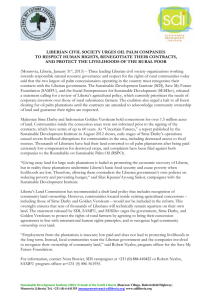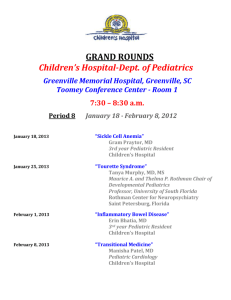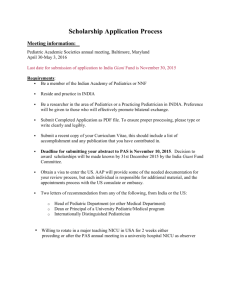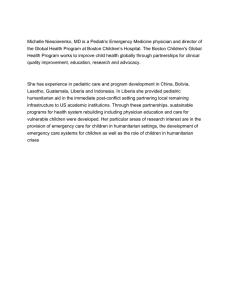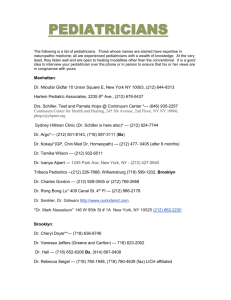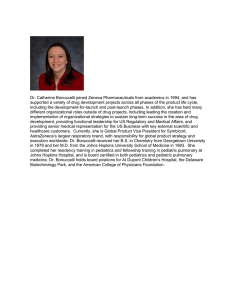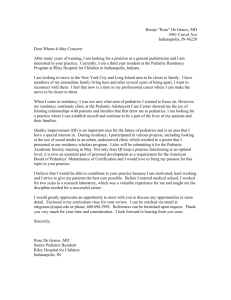Improving Global Health Care Delivery Through Collaboration & Partnership Michelle Niescierenko MD
advertisement
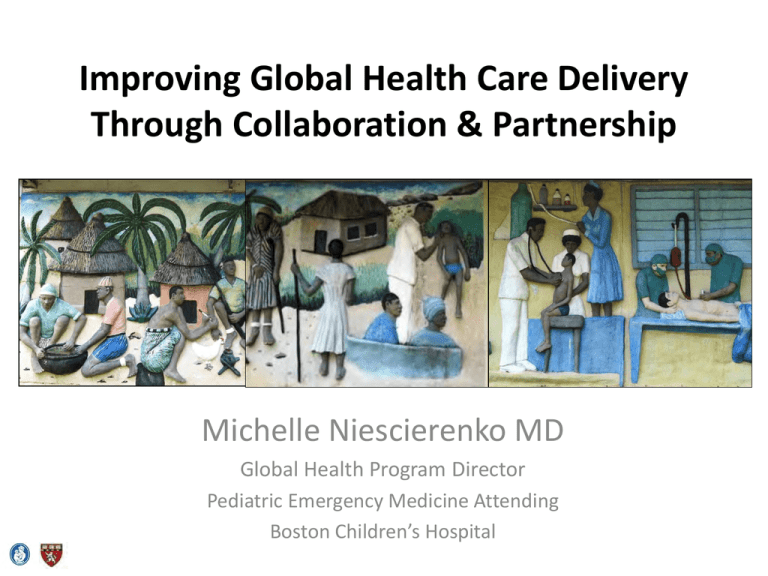
Improving Global Health Care Delivery Through Collaboration & Partnership Michelle Niescierenko MD Global Health Program Director Pediatric Emergency Medicine Attending Boston Children’s Hospital Disclosures • No financial disclosures • No conflicts of interest • All photos unless otherwise cited taken for use in teaching with parental verbal consent Objectives • Country Background: Liberia • Program development timeline – Quality improvement initiatives – Interventional & research projects • Challenges Why Liberia? • I was a senior pediatrics resident • A new project was starting in Liberia • The project lead asked me “you have experience in Africa – can you work in Liberia?” With permission, Mapoteng Lesotho Liberia • 150 years of close US relations • Charter member of United Nations • Former tertiary referral & training center for all of North/West/South Africa • 4.1 million people Liberia 1989-2003: Disastrous Civil War from 2005: Democratic election of the first women president in Africa 2011: Re-election 2014: Reconstruction Effect of Civil War on Child Health Statistics 2003 2009-2011 Population (Millions) 3.03 3.9 Population < 15y (%) 44 44 Under 5 (per/1,000) 164 78 Under 1 (per/1,000) 112 58 Stunting (%) 45 38 Underweight (%) 23 20 Measles 47 64 DPT 39 64 Mortality Malnutrition Immunization WHO, Global Health Observatory Health Status • 50% of the population is <15 yrs • Under 5 mortality in the top 5 • Stunting due to malnutrition • HIV prevalence 6% • 224 physicians in the country • 2 Pediatricians Evolution of an Academic Collaborative 2006 HEARTT Formed 2006 2008 HEARTT Formed Pediatrics Roles of Visiting Clinicians • US Faculty Responsibilities – – – – Give didactic lectures Teach on clinical rounds Support Liberian Trainees Orient/Supervise US residents • US Resident Responsibilities – – – – Model good clinical practice Work alongside Liberian interns and SMO Clinical teaching Supplement medical student teaching *Residents sent in teams with at least one faculty mentor for the first 2 weeks Frequency of US Trainee Global Health Electives 2012 2012 1980 1996 Resident Global Health Electives Perceived Benefits: • Improved clinical skills • Greater appreciation of public health • Enhanced resident recruitment Criticisms/ Ethical Concerns: • Premature responsibility given to trainees • Burden imposed on host countries to provide housing, food, etc. • Lack of defined learning objectives • Inadequate supervision Thompson M et al 2003 & Crump JA 2008 AAP Consensus Guidelines American Academy of Pediatrics (AAP) develops consensus guidelines for international child health electives during residency training 4 Principles: (1) prerequisite training (2) adequate supervision (3) pre-departure orientation (4) formal evaluation Torjesen K et al 1999 Resident Elective 1. Prerequisite training Only 3rd year pediatrics residents Have completed supervisory, NICU, ED & ICU rotations 2. Adequate Supervision All US residents supervised by US faculty Residents perform duties alongside US faculty 3. Pre-Departure Orientation Two day pre-departure meeting Didactic Lectures & Discussion Simulation Cases Orientation Manual 4. Formal Evaluation Residents are evaluated by US faculty Residents evaluate the rotation US Pediatric Workforce in Liberia 2008 2009 2010 2011 Total % Repeating Resident 4 10 11 16 41 12% Fellow 2 5 5 2 14 50% Faculty 3 5 7 11 26 42% Liberia Rotation and Impact on Resident’s Career Choices 10% unsure 10% Influenced Fellowship choice 33% - 5% None 42% -Stimulated an Interest in incorporating GH Reaffirmed an interest in incoporating GH University of Massachusetts 2011 2006 HEARTT Formed 2008 2009 Pediatrics Long-term Pediatrician Collaborative Medical Education Clinical Pediatric Teaching Curriculum Design Clinical Practice Guideline Revision of Pediatric Clerkship Curriculum Case Conferences Pediatric Graduate Medical Education Journal Clubs Board Review Course – WACP* Grand Rounds Didactic Teaching Administration of Pediatric Exams 3rd year Medical Student Curriculum Preparation of written exams 4th year Medical Student Curriculum Oral exams *WACP: West African College of Physicians Liberian Physician Pipeline Number of Medical Students Dogliotti College of Medicine Graduates 60 50 50 41 40 50 38 30 20 10 16 8 4 0 2008 2009 2010 2011 2012 2013 2014* 2015* 2016* Years * Expected graduates based upon current class size A.M. Dogliotti School of Medicine Quality Improvement Clinical Practice Guidelines • • • • • • • • • • Anemia Burkitt’s Lymphoma DKA Malaria Malnutrition Neonatal Sepsis Seizure management Tuberculosis Tetanus HIV Overall Pediatric Ward Mortality Rate 35 30 Mortality Rate (%) 25 20 15 10 5 0 2008 2010 2013 (Rainy Season) Year 2013 (Dry Season) 2006 HEARTT Formed 2008 2009 2010 Pediatrics World Bank Pediatrician ACSMEL NCD Clinic Academic Collaborative to Support Medical Education in Liberia Baystate Medical Center SUNY Upstate Medical Center Springfield, MA Syracuse ,NY University of Massachusetts Medical Center Worcester, MA Harborview Medical Seattle, WA Boston Children’s Hospital Boston, MA Mount Sinai Medical Center A.M. Dogliotti College of Medicine New York, NY Monrovia, Liberia Chronic Care Clinic • Over a million children world wide suffer from non-communicable diseases (NCDs) • 29 million people die annually due to NCD • Low/middle-income countries – 80% of deaths • ½ million children with diabetes • 1/120 born with congenital heart disease • 15 million DALYs lost to asthma annually A focus on children and NCDs, United Nations Summit 2011 Clinic Operations • Funded by a three year I-CATCH grant from the AAP • Patients with NCD enrolled from the ward • Charts are pulled the day before, eliminates waiting in line • Patients receive a reminder phone call • Patients seen by local pediatrician or visiting pediatric faculty or residents • Management guided by disease-specific protocols • Future appointments are scheduled and entered into log book SOIC H International Community Access to Child Health CCC Outcomes • 338 total patients • 73% under age 5 years • 25% had more than one admission prior to enrollment • 48 unique diagnoses Diagnoses per Patient 12% 26% 62% 38% 61% One Diagnosis Two Diagnoses Three/+ Diagnoses CCC Outcomes Burden of Types of NCDs Among Clinic Population 30% Percent of Clinic Population 25% 20% 15% 10% 5% 0% CCC Outcomes Follow Up Visit Attendance* Percent of Follow Up Visits Attended 120% 100% 80% 60% 40% 20% 0% Enrollment Visit 1st 2nd 3rd 4th 5 or More Visit Number *Mean follow up 60 days, std 70 days, range 1 - 553 days 0 89* 50 27* Sickle Cell Disease 100 Seizure Disorder 46* Developmental Delay 150 Congenital Heart Disease 200 Cerebral Palsey Asthma Follow Up Time (Days) CCC Outcomes Follow Up Visit Compliance by Disease 250 61* 28* 72* Post clinic enrollment admission rate: • • • • 11% (22/196 patients), mean 130 days range 2-445 days Standard deviation 137 days 2006 HEARTT Formed 2008 2009 2010 Pediatrics World Bank Pediatrician NCD Clinic ACSMEL 2011 Liberian Pediatricians 2006 HEARTT Formed 2008 2009 2010 Pediatrics World Bank Pediatrician NCD Clinic ACSMEL 2011 Liberian Pediatricians 2012 NICU Clinic Malaria, GME Civil War and Physician Work Force 2003 2012 Total Physicians 100 200 Practicing Physicians 50 150 Pediatricians* 0 2 General Surgeons 2 3 Anesthesiologists 0 0 *44% population 0-14 years of age Liberian Medical and Dental Board Physicians/1,000 people (Generalist & Subspecialist) Global Physician Workforce Time (Years) World Development Indicators, World Bank Liberian Physician Pipeline Number of Medical Students Dogliotti College of Medicine Graduates 60 50 50 41 40 50 38 30 20 10 16 8 4 0 2008 2009 2010 2011 2012 2013 2014* 2015* 2016* Years * Expected graduates based upon current class size A.M. Dogliotti School of Medicine Liberian Physician Pipeline • Internship – 1 year graduate medical training – Pediatrics, OB/GYN, Surgery, Medicine – 24 spots available per year • Rural Service – Posting in a district hospital – 2 years service required • Senior Medical Officer – Clinical service in area of interest (e.g. pediatrics) – No additional training in that area • Residency/Graduate Medical Education – Not previously available in Liberia Liberian Pediatric Health Care Work Force Needs • Limited generalist faculty – Pediatrics 2 – Medicine 4 – Surgery 1 – OB/GYN 2 • No subspecialty faculty Academic Collaborative to Support Medical Education in Liberia (ACSMEL) Supporting GME Development • Work with the Liberian Post Graduate Medical Council • Serve as support faculty for the Liberian faculty • Assist with GME as requested – Curriculum review & design – Preparation of residency candidates – Examination writing – Faculty staffing 2009 2010 World Bank Pediatrician NCD Clinic ACSMEL 2011 Liberian Pediatricians 2012 NICU Clinic GME 2013 Teen Moms Residencies Liberian Residency Training • Inaugural class started September 2013 • Pediatrics, OB/GYN, Medicine, Surgery • Decentralized training around Liberia • Equipment Procurement • First 6 months of generalist time at JFKMC • Need for resuscitation training Pediatric Resuscitation & Life Support • PALS administered by the American Heart Association • No AHA training center in West African • Appropriateness – 6 years of experience – Knowledge of the trainees • AHA permission to use validated assessment tools Methods • September 2013 – Setting appropriate simulation cases written – Curriculum adapted into site appropriate delivery format (lecture) • October 2013 PALS Pretest given – Pediatric residents took it – Surgery residents did not – After pretest study guides given out Methods • November 2013 – 4 lecture series on respiratory cases • December 2013 – 4 lecture series on shock cases • January 2014 – In person 3 day course – Taught by myself and one assistant Course Schedule Time Day 1 10a-11a Pre-test 11a-11:30a Course Overview/ PALS Approach 11:30-12:30p Primary Assessment & Interventions 12:30-1:30p Lunch 1:30-2:30 Respiratory and Shock Cases 2:30p-3:15p Monitoring 3:15p-5p CPR Course Schedule Time Day 2 10a-12p Cardiac Rhythm Interpretation 12p-1p Lunch 1p-2p Resuscitation Team Concept 2p-3p PALS Algorithm Review 3:30 – 5p Simulation Scenarios Time Day 3 10a-12:30p Practice Scenarios 1:30p-3:30p Testing on Scenarios 3:30p-5p Written Exam Interactive Lectures Lectures Barriers to Simulation Simulation Performance Pediatrics Residents 100 90 80 70 60 50 40 30 20 10 0 Pre Test (Untimed Pre Test (Timed) Final Exam (1st Attempt) Performance Measure Final Exam (2nd Attemp) Performance Surgical Residents 120 100 80 60 40 20 0 Pre Test (Untimed) Pre Test (Timed) Final Exam (1st Attempt) Performance Measure Final Exam (2nd Attemp) 2009 2010 World Bank Pediatrician NCD Clinic ACSMEL 2011 Liberian Pediatricians -Residency educational needs -Country wide trauma study • Large database • Public policy 2012 NICU Clinic GME 2013 Teen Moms Residencies 2014 ??? Challenges • Meeting the needs – Staffing – Identified clinical needs – Supply chain • Communication – – – – Monthly phone calls Frequent emails Team sign-outs Skype with Liberian colleagues Challenges • Funding – Institutions – Project specific – Larger funders • Cultural – Shared decision making – Prioritization – Cultural competency From the Liberian side… • Consistent group of faculty members – Longer stays preferred • Overwhelmed by resident numbers • Temper enthusiasm of volunteers • Transparency • Supported decision making Kraeker C et al, Acad Med 2013 Questions & Thanks!
